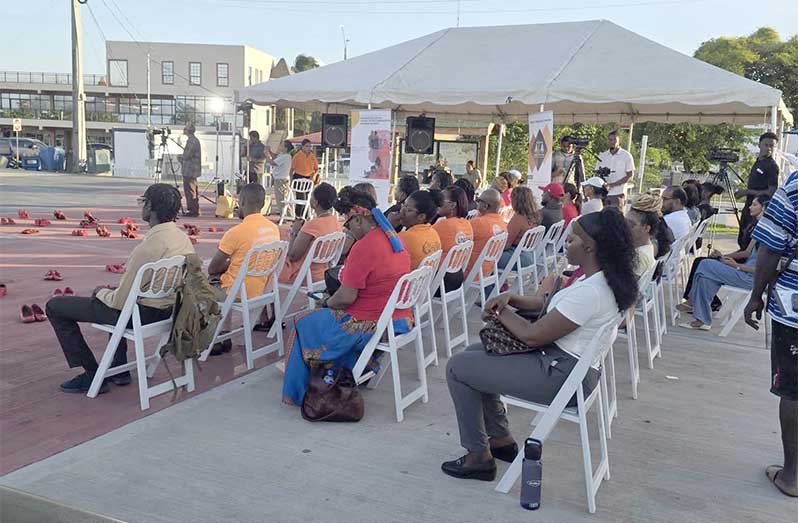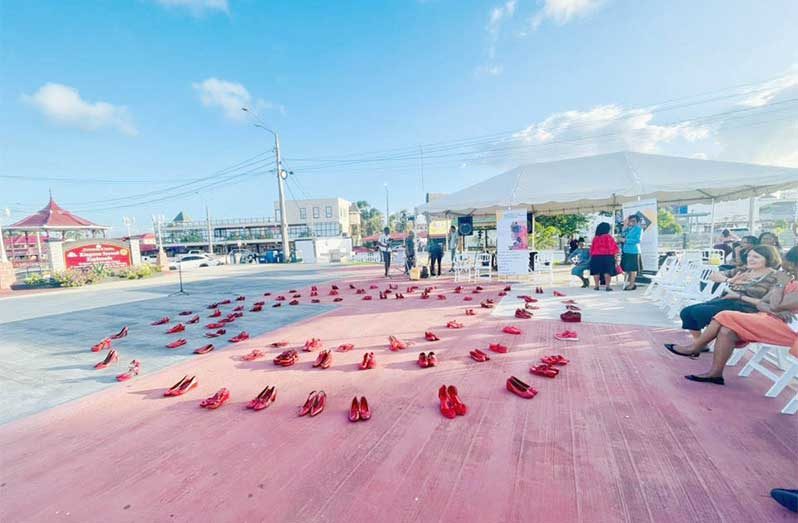–Survivors, organisations gather to address digital violence as new frontier in fight against gender-based violence
THE Kitty Seawall Esplanade was transformed into a striking sea of red shoes on Tuesday afternoon, as civil society groups and international partners hosted the second annual memorial aimed at honouring survivors and victims of gender-based violence (GBV).
The installation, now a signature visual for the 16 Days of Activism campaign, was paired with a sobering exhibit featuring the stories of Guyanese women recently killed or harmed as a result of gender-based violence.
The atmosphere was solemn but resolute, as survivors, activists and advocates gathered to push back against what they described as an evolving and more complex frontier of violence: digital harm.

Hosted by the Guyana Civil Society National Reference Group, ChildLink Guyana, the United Nations Guyana, and the Women and Gender Equality Commission, the ceremony featured an open-mic session that gave survivors the platform to publicly reclaim their voices, challenge stigma, and call for sustained national action.
Delivering one of the afternoon’s keynote reflections, UN Resident Coordinator, Jean Kamau, underscored the scale of the crisis, noting that GBV remains one of the most pervasive human-rights violations worldwide.
Kamau warned that the global community is seeing the rapid expansion of a newer, more insidious form of abuse: digital violence.
“While the online world was meant to create connectivity and opportunity, it has become a source of harm for many women and girls—especially activists, journalists, women in politics, and human rights defenders,” she said, stressing the need for stronger systems, laws and public literacy to safeguard vulnerable groups.
Also sharing impactful words was Chief Executive Officer of the Women and Gender Equality Commission, Renata Chuck-A-Sang, who delivered a blunt reminder that GBV often only captures public attention when lives are lost. She argued that prevention must become just as visible as tragedy.
“The Civil Society National Reference Group is working toward eliminating violence against women and girls,” she said. “We hope events like this will call attention and spur each of us to individually make a decision.”
Chuck-A-Sang said survivor testimonies must remain central to the national conversation, noting that stories of resilience are critical for shifting public understanding and strengthening community responsibility.
Looking deeper at the theme of ending digital violence against women, Managing Director of ChildLink, Omattie Madray, highlighted that the digital space can be dangerous for Guyanese women and girls as well, citing cases of young women and girls experiencing digital violence by unknown online perpetrators.
“This is not new, but it is growing,” Madray explained. “We have had cases where perpetrators are targeting girls, and some of them do not even live in Guyana.”
She underscored the importance of school-level intervention for both boys and girls, noting that prevention must adapt to the realities of how young people interact with technology.
“Every one of us needs to be an ally,” she said. “Today’s event is about rethinking prevention—how we help young girls, young women, and equip them to navigate the digital world safely.”
The memorial closed with emotional testimonies from several survivors who used the open mic to speak openly about their experiences. Their voices unfiltered, courageous and deeply personal formed the most powerful moment of the evening, reinforcing the urgency for stronger community engagement in the fight against GBV.
The annual red shoes exhibit continues to serve as both a memorial and a warning: Guyana’s GBV crisis is evolving, and addressing digital violence must now be part of the national response.



.jpg)









